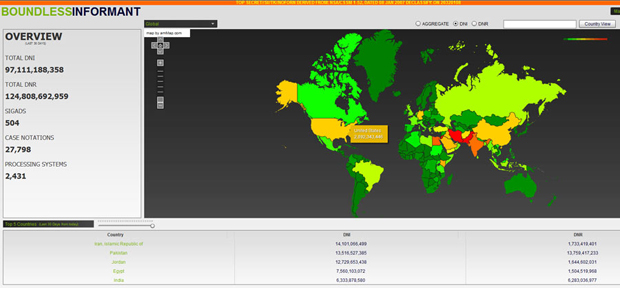Is India about to gets its own PRISM?
Two surveillance entities are being set up to monitor Indian citizens’ communications, Mahima Kaul writes
Two surveillance entities are being set up to monitor Indian citizens’ communications, Mahima Kaul writes
While the official Chinese reaction to Edward Snowden’s Prism leaks has been muted, ordinary Chinese have been quick to point out the US’ double standard on espionage, Alice Xin Liu writes

Snapshot of Boundless Information global heat map of data collection. The color scheme ranges from green (least subjected to surveillance) through yellow and orange to red (most surveillance). (NSA)
A Bahraini teenager has been given jail time for a tweet. Sara Yasin looks at how the country has pursued users of the popular social networking site
A seventeen-year-old student has been sentenced to one year in prison for allegedly insulting Bahrain’s king on Twitter. Ali Faisal Alshofa was first arrested in March this year. The teenager has been accused of posting the tweet in question using the @alkawarahnews account, but he has denied any ties to the account.
The Bahrain Center for Human Rights (BCHR) has condemned the teenager’s arrest, as well as “the ongoing crackdown on online users, and use of the judicial system to limit their free speech.”
Reporters Without Borders has labelled Bahrain one of the “enemies of the Internet” for its usage of surveillance technology, and relentless pursuit of dissidents online.
Despite claiming that it upholds free speech, Bahrain has been no stranger to punishing speech online.
Here’s a handy guide to the country’s free speech violations against Twitter users:
The EU needs to develop a coherent and comprehensive digital freedom strategy. Brian Pellot writes
Recent revelations from the US National Security Agency have shown that our fundamental rights to privacy and freedom of expression are being compromised on a global scale. This is true despite false assurances to the contrary and the US government’s consistent rhetoric celebrating digital freedom. Unfortunately, the US is far from alone in peddling such hypocrisy. The EU as a whole and its individual member states also promote digital freedom in press conferences yet often undermine positive words with contradictory policies at home and abroad.